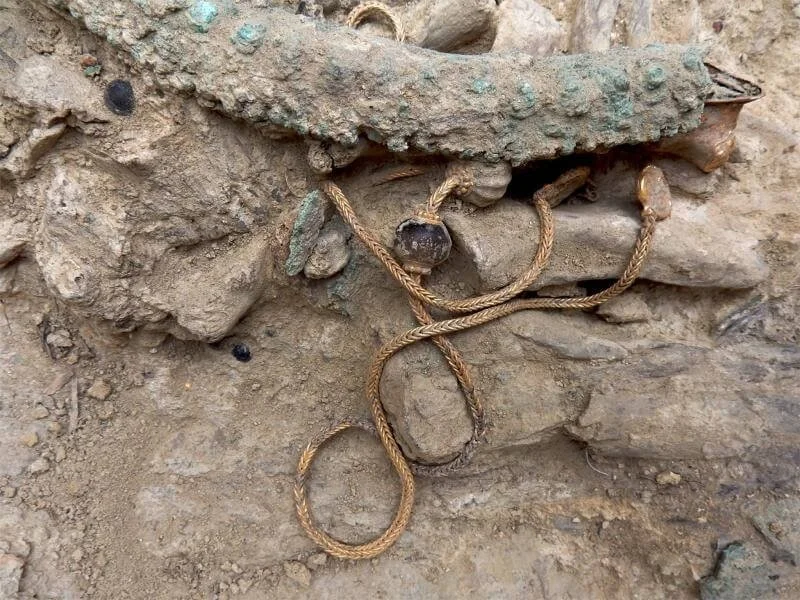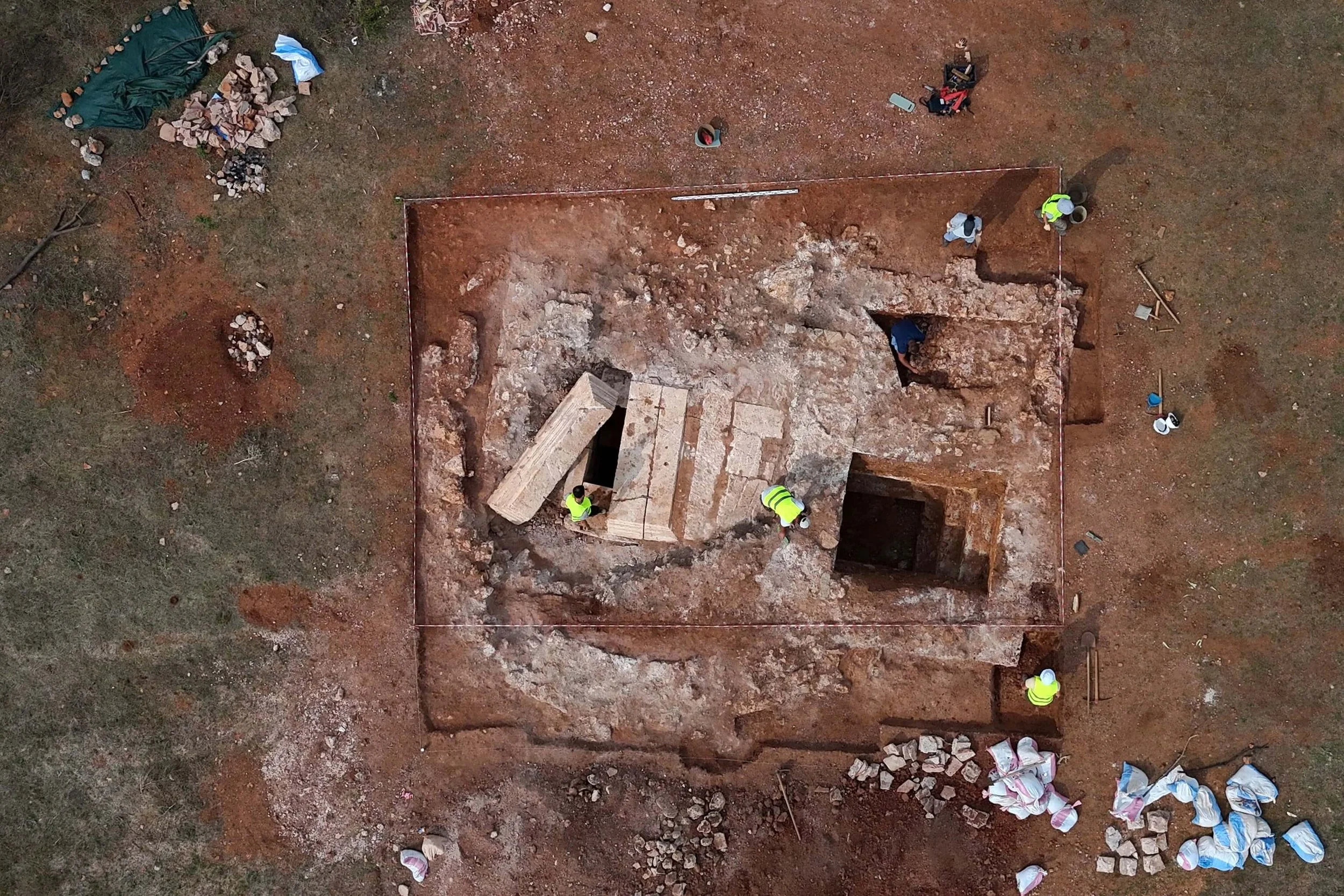Pride comes before a fall. If you don't believe me, Emperor Wu of Han is a good example. He was a great emperor who made China great and defeated the indestructible Xiongnu people. But he was proud and had a major fall when he indulged in immortality and magicians. Stay tuned, and don't touch that dial as we go back to bring you the BIZARRE lifestyle of Wu.
Scientists Dug Beneath Jerusalem Holy Western Wall, They Discovered These Eerie Underground Chambers
Pre-army kids are excavating beneath the Israel Antiquities Authority. Jerusalem's iconic Western Wall and the adjoining Plaza they're delving under a mosaic floor that was once part of a Byzantine building dating back 14 centuries and what they find underground astonishes both the men and the experts running the excavation when experts dug beneath Jerusalem's holy Western Wall they found these Erie underground Chambers.
Scientists In Egypt JUST Found An UNTOUCHED Miracle While Looking For Cleopatra!
Archaeologists have met with shocking sites to find answers, like where the Tomb of ancient Cleopatra vii lies. So many staggering discoveries have been recently made, but they still seem to be somewhere around the tip of the iceberg. Consequently, in an attempt to find Cleopatra's Tomb, archaeologists found several other shocking things that will blow your mind. But what are they? Stick around to find out!
Egyptians from ancient times to the present have been full of surprises. Following the standards of old, modern Egyptians are undertaking breathtaking projects. Digging up their first man-made river in the desert is one big break. This is the second of its kind following the first artificial river dug in Libya. The reason for this undertaking is to recover desert lands of about 2.8 million hectares for agriculture, worth about $58 billion. What a way to maintain the set standards of an ancient civilization!
But while all this is ongoing, there are still many secrets to be uncovered from the past. One of these secrets is the location of the Tomb of Cleopatra vii. Currently, historians, archeologists, and the general public are curious, and as the investigation continues, archeologists draw closer to finding answers. But, in the process of finding solutions, here are some shocking discoveries that scientists and archeologists have made, leaving so many mouths agape.
The Epic Story of Perseus Explained
The story of Perseus is one of the most famous in Greek Mythology, with his adventures across Ancient Greece making him one of the original Heroes, a time long before the Trojan War and the birth of Hercules. The son of Zeus and Danaë, Perseus would defeat the Gorgon Medusa, with her head able to turn any man to stone, a weapon that aided him on his travels. On his way back home from Medusa’s cave, Perseus would rescue the beautiful Andromeda from the sea monster Cetus with the two soon becoming husband and wife. As the years went on and the pair looked to start their own family, they would head out of Argos and found their own kingdom called Mycenae, which would become the most powerful city in Greece.
Ruling over the city, Perseus and Andromeda would have many children together, with their family's reign lasting for generations to come. But unknown to them, one of their descendants would become the most famous Hero of them all. For the son of Zeus and Alcmene, would be the great hero Hercules, whose famous 12 labours would echo throughout every corner of the world.
Shocking Truth Exposed! Antarctica's Dark Secrets Unveiled by Scientists!
Antarctica is one of the most extreme and inhospitable places on earth. While the frigid lands and seas of the South Pole still seem like surreal worlds we know only from documentaries, for some researchers they serve as permanent homes for months. But how do the daring men and women actually manage to defy the freezing cold and the harsh conditions? Or to put it briefly: How do you manage to survive in Antarctica? How are supplies and everyday life organized in the isolated ice world - and what are we doing in Antarctica anyway? Stick around until the end to find out!
12 Most Incredible Recent Archaeological Finds
The profession of archaeology has been around for thousands of years. Cleopatra even had archaeologists studying the pyramids of Egypt during her lifetime, as they were as big a mystery to the people of her era as they are to us today! Some of the most remarkable archaeological finds in history have happened in the past few years, though, and we’ll prove it in this video.
Evolution of Live birth (Why mammals do not lay eggs?)
Mammals, like almost all other types of animal today, used to lay eggs, but then they adapted to give birth to live young. Why did some mammals make this change and if it has been so beneficial why haven't more animals evolved to do it?
Animism: The First Religion?
Anthropologists in the late 19th and early 20th centuries hypothesized that animism was the earliest religion. But later scholars have called this theory into question. What is animism? And how should we categorize it?
Mysterious Lost Ancient Places
In today’s video we will be exploring mysterious lost ancient places. Enjoy!
A new ocean is being formed in Africa
A new ocean is being formed in Africa. Geologists have confirmed that a new ocean is being created as the African continent is split in half. An international effort has revealed that a 35 miles long rift appeared in the Ethiopian deserts of the Far region in 2005 and is probably the start of a brand-new sea.
The recent study, published in the journal Geophysical Research Letters, combines seismic data from the rift formation to demonstrate that it is driven by processes similar to those at the ocean's bottom. The tectonic plates of Africa and Arabia collide in the desert and have been gradually separating for about 30 million years. The same motion has also split the Red Sea, but this is only happening at a rate of a fraction of an inch per year.
Soon humanity might have two motherlands. Africa's 54 nations are being divided according to geologists researching the continent's plate tectonics. The East African Rift, which separates eastern coastal countries like Kenya and Tanzania from most of the continent, passes across Mozambique from the Afar area of northern Ethiopia.
A new study in the journal Nature found that the two pieces of land are separating at a rate of 7 millimeters per year. Nations like Zambia and Uganda will have their own coastlines. Scientists claim that several currently active volcanoes along the river, including the Aloo Dalapila in Ethiopia and the Old wenyolangai in Tanzania, provide new insights into the process. In particular, the Erta Ale volcano in Ethiopia has been erupting nonstop for more than 50 years. The Victoria microplate, the biggest of its kind on Earth and tucked between each side of the rift, has been rotating against the clock for the past two years.
Nyx, the Only God Zeus Feared: Was She More Powerful Than Zeus?
In today’s video, we’re going to discuss Nyx, a primordial deity and the personification of night, one of the most powerful goddesses, if not the most powerful goddess, in all of Greek mythology. First, we’re going to look at what Greek mythology has to say about Nyx, which can be broken down into three parts: Nyx’s role in the creation myth given in Hesiod’s Theogony, Nyx’s dark and shadowy house at the edge of creation, and some information about the Trojan War that dovetails into Nyx’s near confrontation with Zeus in which she protects her son Hypnos and basically scares the king of the gods away.
Homo erectus: Why Did the Most Successful Early Human Go Extinct?
The Ancients host Tristan Hughes sits down with Professor John Mcnabb at the University of Southampton to discuss the extinct species of archaic human, Homo Erectus (aka the 'Upright Man') that existed about 2 million years ago.
Were these ancient ancestors the first to make stone tools? Were they the first to create fires? How did they hunt? How similar were they to Neanderthals and Homo Sapiens? Why did they go extinct?
Tristan and John cover all of this ground as well as touching upon another species of human that lived on the remote islands of Indonesia, Homo Floresiensis, otherwise known as 'The Hobbit' due to its small structure and features.
What Happened to The Templars in The Battle with The Sultan of Egypt
In today’s video we will investigate what happened in the battle of The Templars vs "The Sultan of Egypt and Syria" Saladin. Enjoy!
The Most Amazing Archaeology Discoveries of Egypt as of 2023
For hundreds of years, Ancient Egypt has been a land full of mysteries and wonders, from the Great Pyramid of Giza to the mummies. It has always been a fascinating place for anthropologists and archaeologists alike to discover new things.
And in the first 30 days of this year that included unearthing a mysterious tomb, a mummy wrapped in gold, and uncovering an entire ancient city.
Joe Rogan: LOST Ancient Advanced Civilizations & How We Know It
In this video Joe Rogan, Graham Hancock & Randall Carlson talks about how big great advanced civilizations must have been lost, because how could then explain the pyramids and other historical monuments? And more!
A Utah Family Were Renovating Their Yard When They Unearthed The Remains Of An Ice Age Beast
After embarking on a home building project, Laura and Bridger Hill were digging up their yard. But when a layer of the ground was removed, something unexpected appeared in the dirt: a row of rib bones. That certainly wasn’t all, though. Following further investigation, the Hills realized that they had the nearly complete skeleton of some mysterious creature on their hands. Yet even at this point, the family had no clue as to the significance of their find (Ice Age Beast).
5 Unexplained Ancient Artifacts That Archaeologists Still Cannot Explain
In today's video, we'll look at five ancient artifacts that scientists have no idea how they were created. Enjoy!
Ancient Weapons From Different Countries
In this video, we made a list of Ancient Weapons From Different Countries | Cosmic Comparison. Enjoy!
12 Most Amazing Ancient Egypt Finds
People love to hear stories about ancient Egypt. Egypt is one of the few countries in the world where most of the tourists who go there do so because of its history rather than any of its present-day attractions - not that there's anything wrong with present-day Egypt! We simply never get tired of hearing about amazing finds in Egypt, and we'd love to share this collection with you.
Ancient 'massacre' unearthed near Lake Turkana, Kenya
Archaeologists say they have unearthed the earliest evidence of warfare between hunter-gatherers to be scientifically dated, at a remote site in northern Kenya.
The 10,000-year-old remains of 27 people found west of Lake Turkana show that they met violent deaths.
They were left to die there rather than being buried.
Many experts have argued that conflict only came about as humans became more settled.
These people, by contrast, were apparently nomadic hunter-gatherers.
The archaeologists, who have been working on the site at Nataruk since 2012, discovered that the victims were clubbed or stabbed to death in a single event.
The dead included male and female adults, as well as children.
The evidence, published in the journal Nature, does not reveal exactly what happened but the fact that so many people died at the same time suggests it was the result of "some sort of conflict", according to Cambridge University Professor Robert Foley.
Why this is significant - Marta Mirazon Lahr, lead researcher:
Nataruk records what is, for now, the oldest scientifically-dated case of conflict between two nomadic hunter-gatherer groups.
Nevertheless, its significance is not its age, but the fact that it involved these groups, who had few possessions to fight over.
Nataruk establishes definitively that inter-group violence can and did arise regardless of whether the populations were settled.
All it needed was moments of food abundance, causing groups to grow in size, putting pressure on the resources. Then the benefits of stealing from another group could outweigh the costs of the conflict that might ensue.
Nataruk was an important place because it was at the edge of a super lake beach which would have attracted all land animals to drink, as well as giving access to fishing grounds, while other parts of the shore of Lake Turkana (the forested Kerio Delta, for example, or the rocky whole southern edge) would not have that.
It is believed that the group was attacked by rival hunter-gatherers armed with wooden clubs and arrows or spears tipped with sharpened obsidian, a rare black volcanic rock.
Speculating on the causes of the attack, Marta Mirazon Lahr, who led the Nataruk study, said the "massacre may have resulted from an attempt to seize resources... whose value was similar to those of later food-producing agricultural societies, among whom violent attacks on settlements became part of life".
Today, the area where the bodies were found is scrubland, but the researchers say that 10,000 years ago it would have been fertile and very close to the shoreline of the lake.
Many experts have argued that conflicts only arise "once people have things worth fighting over, [such as] herds of livestock, stores of grain... things that you can both defend and attack," Professor Foley told the BBC's Newsday radio programme.
It has been assumed that hunter-gatherers were less likely to engage in such conflicts because they can move away, but the Nataruk find shows that "before we have settled life, groups were competing over resources", Professor Foley added.










